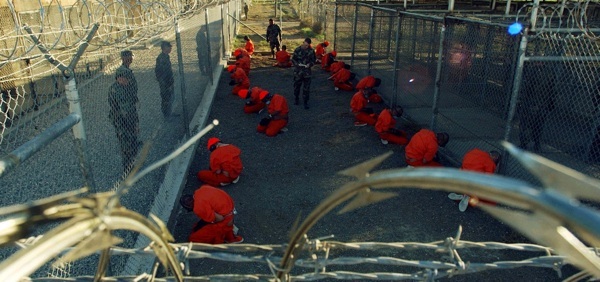Were Doctors Complicit in Torture?
A new study finds medical professionals neglected or concealed the mistreatment of detainees at Guantanamo Bay

The "enhanced interrogation methods" used by the Bush Administration required the complicity of doctors and psychologists. In the CIA, for example, staff from the Office of Medical Services were consulted to see if detainees had been subjected to "severe mental pain or suffering," the standard established by Jay Bybee and John Yoo in their since-discredited legal memos defining torture.
Some of these medical professionals exercised highly questionable judgment, as we've long known. Here's how Leonard Rubenstein and Stephen Xenakis explained it last year The New York Times:
...the medical service opined that sleep deprivation up to 180 hours didn't qualify as torture. It determined that confinement in a dark, small space for 18 hours a day was acceptable. It said detainees could be exposed to cold air or hosed down with cold water for up to two-thirds of the time it takes for hypothermia to set in. And it advised that placing a detainee in handcuffs attached by a chain to a ceiling, then forcing him to stand with his feet shackled to a bolt in the floor, "does not result in significant pain for the subject."
Still, the fact that medical personnel were present to monitor interrogations has been used by Bush Administration apologists to insist that the "enhanced techniques" never rose to the level of torture. That's why a study released this week is important. Its authors examined the treatment of nine detainees held at Guantanamo Bay, and the role that medical professionals played in their ordeals.
Their conclusion:
The findings in these nine cases indicate that medical doctors and mental health personnel assigned to the US Department of Defense neglected and/or concealed medical evidence of intentional harm.
In other words, the folks charged with making sure interrogators didn't cross the line abdicated that responsibility (at least in these nine cases -- the authors note they may not be representative of all Gitmo detainees). Having laid out their findings, the authors conclude as follows:
The full extent of medical complicity in US torture practices will not be known until there is a thorough, impartial investigation including relevant classified information. We believe that, until such time as such an investigation is undertaken, and those responsible for torture are held accountable, the ethical integrity of medical and other healing professions remains compromised.
In theory, supporters of the Bush interrogation practices should be open to such an investigation. On its own terms, the Bybee/Yoo approach requires medical professionals as monitors. Were they actually intent on making sure that "America doesn't torture," as President Bush put it, they'd be alarmed by the notion that their own safeguard for stopping short of illegal torture is prone to failure. In reality, however, they don't give a damn about the suffering of detainees, so long as it doesn't land them in jail. Thus there are no circumstances in which Bush Administration apologists will acknowledge the illegality and immorality of that government's behavior.
President Obama is intent on avoiding investigations too, despite the fact that a treaty duly ratified by the U.S. Senate obligates him to do so. In this way, lawlessness builds on itself, and torturers go unpunished.
Image credit: Reuters